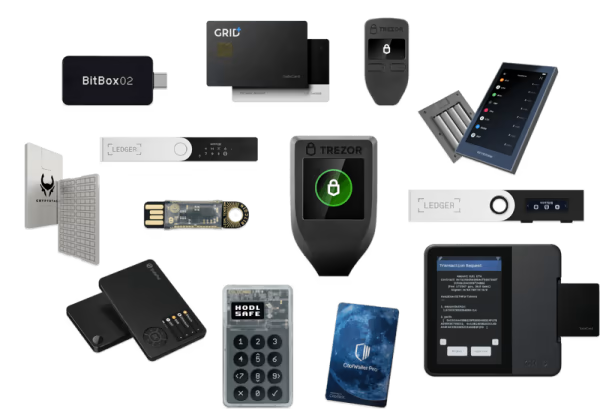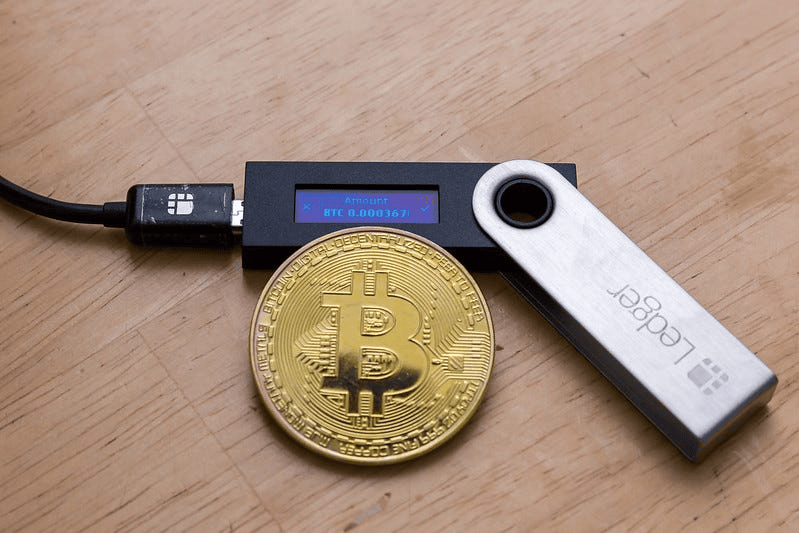Cryptocurrencies have gained significant popularity in recent years, revolutionizing how we think about money and financial transactions. However, with this surge in digital assets comes the need for robust security measures to protect them from hacking attempts and theft. In the world of cryptocurrencies, a hardware wallet has emerged as a crucial tool for ensuring the safety of your digital assets.
What is a Hardware Wallet?
It is a physical device that stores and protects your cryptocurrencies. Unlike software wallets that operate on internet-connected devices, such as computers or smartphones, these wallets are offline devices, providing an added layer of security by keeping your private keys offline and isolated from potential cyber threats.
The Importance of Secure Storage
Cryptocurrencies operate on the principle of decentralization, where you have complete control over your digital assets. However, this control also means you are solely responsible for their security. Storing your cryptocurrencies on exchanges or online wallets can expose them to potential risks, including hacking, phishing attacks, and fraudulent activities. A hardware wallet offers a secure and reliable solution by providing an offline storage mechanism that safeguards your private keys.
Secure Storage for Cryptocurrency's Importance
The previous chapter introduced the hardware wallet as a secure solution for storing and managing cryptocurrencies. Now, let's delve deeper into safe storage for your digital assets. Understanding the potential risks associated with other storage methods will highlight wallets' critical role in maintaining the integrity and security of your cryptocurrencies.
Online Wallets
Storing your cryptocurrencies on online wallets or exchanges can expose them to various security risks. For example, these platforms are vulnerable to hacking attempts, phishing attacks, and internal fraud. Moreover, relying on third-party custodians means you relinquish control over your private keys, potentially compromising the security and ownership of your assets.
Software Wallets
Software wallets operating on internet-connected devices can be susceptible to malware and keyloggers. These malicious programs can capture your private keys and compromise the security of your cryptocurrencies. Additionally, if your device gets lost or damaged, you may risk losing access to your funds without proper backup measures.
Exploring the Benefits of Hardware Wallets for Crypto Investors
Now, let's explore these wallets' benefits to crypto investors. Whether a seasoned trader or a long-term holder, a hardware wallet can provide peace of mind and robust security for your digital assets.
Enhanced Security
One of the primary advantages is its enhanced security features. These devices protect your private keys, which are essential for accessing and managing your cryptocurrencies. By keeping your private keys offline and isolated from internet-connected devices, these wallets eliminate the risk of online threats, such as malware, keyloggers, and phishing attacks. In addition, this offline storage mechanism significantly reduces the likelihood of unauthorized access to your funds.
User-Friendly Interface
They typically come with user-friendly interfaces that make them accessible to both experienced crypto enthusiasts and beginners. These interfaces often feature clear instructions, intuitive navigation, and simple transaction processes. As a result, even if you have limited technical knowledge, you can easily set up and operate a hardware wallet without any hassle.
Multi-Currency Support
A hardware wallet supports a lot of cryptocurrencies, including Bitcoin, Ethereum, Litecoin, etc. This multi-currency support allows you to store and manage digital assets in one device, eliminating the need for multiple wallets. Having all your cryptocurrencies in a single wallet streamlines your portfolio management and simplifies the process of securely storing and accessing different coins.
Seamless Integration with Wallet Software
They seamlessly integrate with wallet software, providing a convenient way to manage cryptocurrencies. In addition, these wallets often have companion applications that allow you to view your balances, track transaction history, and initiate transfers. Integrating the hardware and software wallets ensures a cohesive and secure user experience.
Offline Transaction Signing
Another essential benefit of these wallets is their ability to facilitate offline transaction signing. When you want to send cryptocurrencies from your hardware wallet, the transaction details are securely transferred to the device, where you review and confirm them offline. This offline signing process ensures that your private keys never leave the secure environment of the wallet, protecting them from potential threats. With cold storage, you can enjoy enhanced security, user-friendly interfaces, multi-currency support, seamless integration with wallet software, and offline transaction signing. These advantages empower you to control your digital assets while minimizing the risks associated with online storage and transactions.
Securely Storing Bitcoin and Altcoins: Best Practices with Hardware Wallet

It's time to explore the best practices for securely storing your Bitcoin and other altcoins. Following additional precautions is essential to ensure the utmost protection for your digital assets. This chapter will discuss critical practices and tips for securely managing cryptocurrencies.
Keep Your Firmware Up to Date
Manufacturers regularly update the firmware to address security vulnerabilities and improve overall performance. Stay informed about firmware updates and ensure your hardware wallet runs the latest version. You benefit from the latest security enhancements and bug fixes by keeping your firmware current.
Enable Two-Factor Authentication (2FA)
Many wallets offer the option to enable two-factor authentication for additional security. 2FA requires you to provide a second verification form, such as a fingerprint or a one-time password, to access your wallet. Enable this feature in your hardware wallet settings to protect against unauthorized access.
Practice Safe PIN Code Usage
The PIN code is your first defense. Ensure you choose a unique, robust PIN code and never share it with anyone. Avoid using easily guessable combinations or personal information that could be compromised. Additionally, shield your device's screen when entering the PIN to prevent shoulder-surfing attacks.
Verify Receiving Addresses
Before initiating cryptocurrency transactions, carefully verify the receiving addresses on your cold storage device's screen. Ensure that the address displayed matches the intended recipient's address to prevent sending funds to the wrong destination. In addition, it's good practice to cross-check the addresses using alternative methods, such as scanning a QR code or manually typing it.
Implement a Backup Strategy
Regularly back up your wallet by securely storing your seed or recovery phrases. Consider creating multiple copies and keeping them in separate secure locations. This backup strategy ensures that you can restore your wallet and regain access to your funds in case of device loss, damage, or theft.
Test Recovery Process
Periodically test the recovery process of your cold wallet using the seed phrase. It involves resetting the device and restoring your wallet using the seed phrase. By doing so, you can verify that the backup is accurate and that you can successfully recover your funds if needed. In addition, this practice provides peace of mind and safeguards against potential issues during recovery.
Be Mindful of Phishing Attempts
Beware of phishing attempts that trick you into revealing your private keys or seed phrases. Instead, access your hardware wallet's companion application from the official website or trusted sources. Be cautious of clicking on suspicious links or providing sensitive information to unknown sources. Verifying the software and communication channels' authenticity is crucial to protect your funds. By following these best practices, you can maximize the security of the cryptocurrencies stored in your cold wallet. These additional precautions give you peace of mind and confidence in managing your digital assets.
Empowering Secure and Convenient Crypto Transactions
The previous chapters explored the benefits and best practices of using cold storage wallets to hold and manage cryptocurrencies securely. Now, let's shift our focus to our PlasBit platform, which offers a secure and privacy-focused solution for holding and using cryptocurrencies. Finally, discover how our crypto debit cards can enhance your crypto experience while maintaining the highest level of privacy.
The Power of Crypto Debit Cards
Our PlasBit crypto debit cards function similarly to traditional debit cards, allowing you to purchase online or in-store, converting your crypto holdings. In addition, our cards are Visa, enabling you to hold, convert, and spend your cryptocurrencies in most worldwide shops, making crypto adoption more accessible.
Secure and Private Transactions
At PlasBit, we prioritize the security and privacy of our users. By leveraging the power of cold storage and advanced encryption technologies, we ensure your crypto transactions remain secure and unnamed. In addition, the users' funds are securely stored in offline cold wallets, protecting against potential hacks or data breaches.
Multi-Currency Support
Our PlasBit wallets support many cryptocurrencies, allowing you to hold and use popular digital assets such as Bitcoin, Ethereum, and more. This multi-currency support ensures that you have flexibility in managing your crypto portfolio and can easily access your preferred cryptocurrencies for everyday transactions.
Real-Time Balance and Tools
We provide a user-friendly website that monitors your card balance and transaction history in real time. This feature, tools, and blog inform you about your crypto spending and ensure you have complete control over your funds. With just a few taps, you can track your transactions and manage your crypto finances effortlessly.
Conclusion
Cryptocurrencies are stored on the blockchain, not in the wallet. The wallet simply lets you access your private keys. Your crypto is precisely where it always was, and it is simple to recover using the recovery phrase or seed phrase. If you’re wondering, “Can someone access my crypto?” the answer is still “no”. In this article, we have explored the importance of hardware wallets, provided setup instructions, discussed best practices for secure storage, and introduced the convenience of PlasBit and our services. By combining the security with the privacy focus of PlasBit, you can confidently navigate the world of cryptocurrencies and experience the best of both worlds. Remember, safeguarding your crypto assets is paramount, and our platform offers a trusted solution that prioritizes security and convenience.







